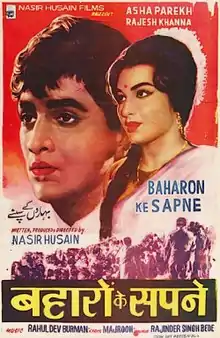Baharon Ke Sapne
Baharon Ke Sapne (Dreams of Spring) is a 1967 Hindi film made under Nasir Hussain films' banner. It starred Rajesh Khanna and the Nasir Hussain fixture - Asha Parekh. It also had Premnath, Madan Puri and another Nasir Hussain fixture Rajendranath. Another pair of Hussain fixtures gave the music - Majrooh Sultanpuri the lyrics and composition by R.D. Burman. It is mostly a black-and-white film, except for one dream sequence: the song "Kya Janoo Sajan" was shot in color. In Bahraon Ke Sapne, the response from the public in the first week of run forced the film's ending to be changed from a tragic one to happier one from the second week.[1]
| Baharon Ke Sapne | |
|---|---|
 Poster | |
| Directed by | Nasir Hussain |
| Produced by | Nasir Hussain |
| Starring | Rajesh Khanna Asha Parekh Premnath |
| Music by | R.D. Burman |
| Cinematography | Jal Mistry |
| Edited by | Babu Lavande, Gurudutt Shirali |
Release date | 23 June 1967 |
| Country | India |
| Language | Hindi |
Synopsis
In a small industrial town near Bombay lives Bholanath, who works at the local mill, and is the proud husband of Gauri, a daughter, Champa, and above all his son, Ramaiya, who is a graduate in the arts faculty, - the only one in this town who has attained this degree. But times are hard, and jobs are difficult to come by. When Bholanath loses his job, Ramaiya decides to find employment, and does so as a menial worker in the same mill his dad used to work. Ramaiya is very popular with his co-workers and they soon elect him as their new union leader. This puts Ramaiya in conflict with the Management of the Mill, headed by the owner, Kapoor, who has ordered that Ramaiya be eliminated post haste. But Ramaiya is determined to address the workers' grievances, and he gets himself framed for theft; has the police on the lookout for him, and so Ramaiya goes into hiding. When Ramaiya does not show up for a workers' meeting, some believe that he has been bought by the mill management, and they decide to take the matters into their own hands - by burning the mill down, killing Kapoor and his family, and getting into direct confrontation with the local police, who have been issued orders to shoot-at-sight.
Cast
- Rajesh Khanna as Ramaiya
- Asha Parekh as Geeta
- Prem Nath as Mr. Kapoor
- Rajendra Nath as Pandu
- Madan Puri as Ranjeet
- Sulochana Latkar as Gouri
- Nana Palsikar as Bholanath
- P. Jairaj
- Anwar Hussain
- Ram Avtar
- Bela Bose as Guest Dancer
- Laxmi Chhaya as Guest Dancer
Production
The film Teesri Manzil was originally supposed to be directed by Nasir Hussain and was to star Dev Anand in the lead. Another of Nasir Hussain's productions Baharon Ke Sapne was to be directed by Vijay Anand. However, on the occasion of Sadhana's engagement party, a misunderstanding erupted between Dev Anand and Nasir Hussain, when apparently, Nasir overheard Dev Anand saying "The film which Nasir is making with me is coloured and he has given Goldie some black-and-white film to make. Goldie is making the movie with some new boy, Rajesh Khanna". It was the next day that Nasir requested Vijay Anand to direct Teesri Manzil and offered to helm Baharon Ke Sapne, but specified that Teesri Manzil would not have Dev Anand in it. It was only then that Shammi Kapoor was approached.[2]
Music
The music for the movie was directed by R. D. Burman while the lyrics were written by Majrooh Sultanpuri.
| # | Song | Singer(s) | Length |
|---|---|---|---|
| 1 | "Chunri Sambhal Gori" | Manna Dey & Lata Mangeshkar | 6:15 |
| 2 | "Zamane Ne Maare Jawan" | Mohammed Rafi | 3:15 |
| 3 | "Aja Piya Tohey Pyar Dun" | Lata Mangeshkar | 4:12 |
| 4 | "Zamane Ne Maare Jawan" | Mohammed Rafi | 4:13 |
| 5 | "O Mere Sajna O Mere Balma" | Lata Mangeshkar & Rajesh Khanna | 4:17 |
| 6 | "Do Pal Jo Teri Aankhon Se" | Asha Bhosle & Usha Mangeshkar | 4:26 |
| 7 | "Kya Janu Sajan" | Lata Mangeshkar | 5:41 |
Awards
Filmfare Best Cinematographer Award—Black & White Film--Jal Mistry [3]
References
- Rajesh Khanna – An Iconic Star Passes Away Archived 1 February 2013 at Archive.today. Sarkaritel.com (19 July 2012).
- "When Dev Anand came to blows with Nasir Hussain". Business Standard. Press Trust of India. 23 October 2016.
- Gulzar, p. 590
- Gulzar; Govind Nihalani; Saibal Chatterjee (2003). Encyclopaedia of Hindi Cinema. Popular Prakashan. ISBN 8179910660.